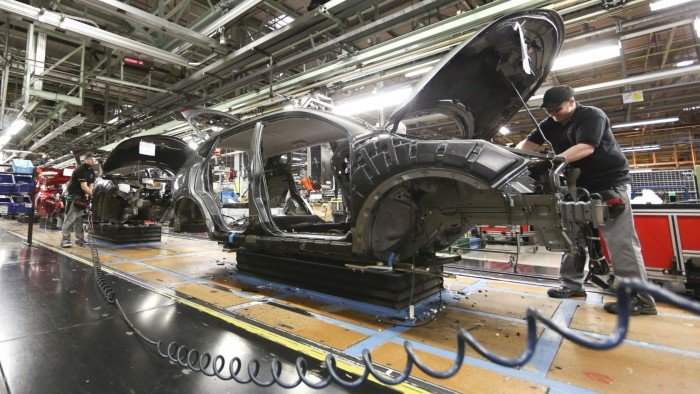Unlock the Editor’s Digest for free
Roula Khalaf, Editor of the FT, selects her favourite stories in this weekly newsletter.
Senior ministers are in urgent negotiations about boosting support for energy intensive British businesses and putting energy costs on a par with France and Germany.
Lowering “eye-watering” UK energy costs will be the centrepiece of the government’s industrial strategy, expected early next week.
In an effort to close the energy cost gap with key EU rivals, business secretary Jonathan Reynolds wants to go further than existing support for the steel and chemicals industries and launch a scheme that helps a much wider range of sectors, including cars, aerospace and advanced manufacturing.
A model is being discussed to give companies discounts on their energy bills when their energy costs exceed a certain percentage of their turnover.
The aim would be to help companies in some of the eight sectors covered by the new industrial strategy: advanced manufacturing, clean energy, creative industries, defence, digital and technologies, financial services, life sciences, and professional and business services.
The move is likely to anger those in the retail and leisure sectors who complain about high energy bills as well as the rise in their staffing costs following the government’s increase to National Insurance contributions.
Ministers are reluctant to fund any discount scheme for industrial users by adding a surcharge to consumer energy bills. One government insider said that “people are paying enough” — but stressed they are also determined to address a situation where Britain has some of the highest energy costs in the world.
“It’s very live,” said one person briefed on the negotiations.
The Treasury has had concerns about the costs of such a scheme and did not agree any funding for it in last week’s spending review. The Department for Business and Trade declined to comment.
The Department for Business would put the scheme out for consultation and aim to get something in place by 2027, according to another person briefed on the talks. “That would give more time to work out how to pay for it.”
The first part of the plan has been agreed: an extension of the “British Industry Supercharger” scheme, which offers a 100 per cent exemption from renewable energy levy costs and a 60 per cent reduction in network charges.
Under the current scheme, UK steelmakers are paying £66/MWh compared to the equivalent German prices of £50/MWh and French prices of £43/MWh, according to industry lobby group Make UK.
To try to address the gap, the government is set to make the network charge reduction more generous and increase it from 60 per cent to 90 per cent, according to three people familiar with the situation.
But the scheme has been criticised by business lobby groups as being too narrow as it currently only applies to 370 businesses making products including steel, chemicals, cement, glass and paper. There are around 250,000 manufacturing companies in the UK.
Stephen Phipson, Make UK chief executive, said industrial energy bills were “eye-watering”, adding: “Any move to bring these costs down to a level in line with our European competitors is likely to lead to a substantial boost to growth, investment and competitiveness.”
Earlier this week, the UK’s largest fibreglass factory was shut down after its Japanese owners highlighted soaring energy costs. A month earlier a 100-year old business, Moorcroft Pottery in Stoke-on-Trent, was the latest ceramic manufacturer to collapse, citing rising energy costs.
Sir Jim Ratcliffe, founder of chemicals group Ineos, warned last month that “excessive” energy costs as well as carbon taxes were “squeezing the life out of the sector”.
